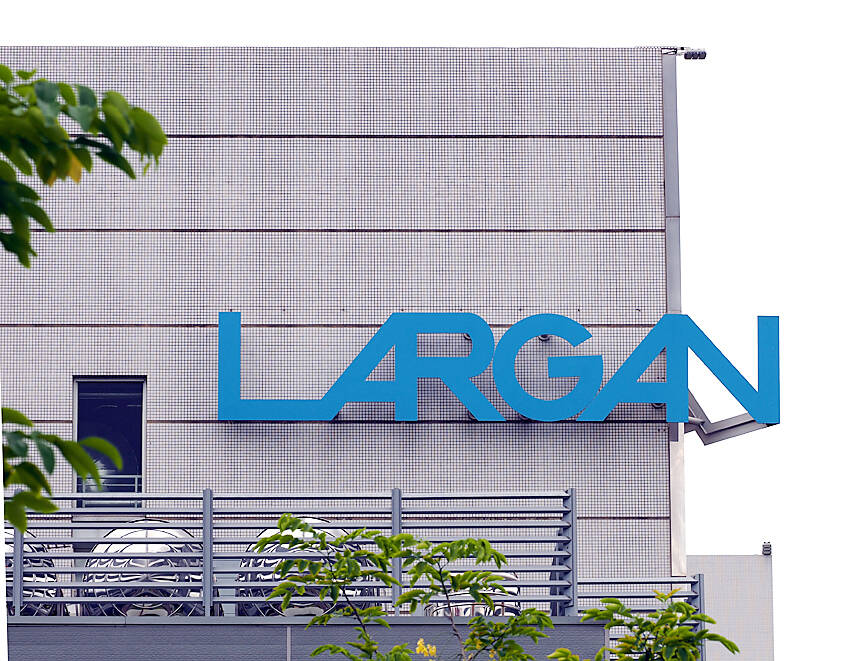Largan Precision Co (大立光), the nation’s leading handset camera lens maker, on Saturday reported a 28.87 percent year-on-year increase in consolidated revenue for the first quarter of this year to NT$14.58 billion (US$44.06 million).
The figure surpassed market expectations, with Capital Investment Management Corp (群益投顧) forecasting NT$14.3 billion and SinoPac Securities Investment Service Corp (永豐投顧) projecting NT$13.77 billion.
However, the figure still fell 19.4 percent from the previous quarter’s NT$18.21 billion as the industry entered its slow season, analysts said.

Photo: David Chang, EPA-EFE
Largan, a technology leader in the high-end smartphone camera lens market, reported earnings per share of NT$194.17 last year, the highest since 2019, driven by trends such as higher camera resolution migration, and growing adoption of periscope and telephoto lenses.
Beyond smartphones, the Taichung-based company has also tapped into new sectors, including the humanoid service robot market, where it has begun sending plastic lens samples to several customers.
Largan has also begun designing camera lenses for robotic arms used in factory automation, executive officer Adam Lin (林恩平) said at an earnings conference on Jan. 9.
The company said that revenue for this month would be lower than last month’s NT$4.89 billion due to seasonal factors.
Largan is to hold an earnings conference on Thursday to release its financial results for the last quarter and provide sales guidance for this quarter. The company is also expected to shed light on lens technology trends for foldable phones, slimmer handsets and artificial intelligence-powered devices.
The market is also expected to focus on the company’s plans for production capacity strategy and its response to the newly imposed tariffs by US President Donald Trump.
As a key supplier to Apple Inc, Largan has been drawn into broader concerns about potential supply chain disruptions.
Apple last week saw the largest two-day loss in shareholder value on record following Trump’s tariff announcement, amid fears about supply chain disruption and the impact on its profit outlook.

In a small town in Paraguay, a showdown is brewing between traditional producers of yerba mate, a bitter herbal tea popular across South America, and miners of a shinier treasure: gold. A rush for the precious metal is pitting mate growers and indigenous groups against the expanding operations of small-scale miners who, until recently, were their neighbors, not nemeses. “They [the miners] have destroyed everything... The canals, springs, swamps,” said Vidal Britez, president of the Yerba Mate Producers’ Association of the town of Paso Yobai, about 210km east of capital Asuncion. “You can see the pollution from the dead fish.

MULTIFACETED: A task force has analyzed possible scenarios and created responses to assist domestic industries in dealing with US tariffs, the economics minister said The Executive Yuan is tomorrow to announce countermeasures to US President Donald Trump’s planned reciprocal tariffs, although the details of the plan would not be made public until Monday next week, Minister of Economic Affairs J.W. Kuo (郭智輝) said yesterday. The Cabinet established an economic and trade task force in November last year to deal with US trade and tariff related issues, Kuo told reporters outside the legislature in Taipei. The task force has been analyzing and evaluating all kinds of scenarios to identify suitable responses and determine how best to assist domestic industries in managing the effects of Trump’s tariffs, he

TIGHT-LIPPED: UMC said it had no merger plans at the moment, after Nikkei Asia reported that the firm and GlobalFoundries were considering restarting merger talks United Microelectronics Corp (UMC, 聯電), the world’s No. 4 contract chipmaker, yesterday launched a new US$5 billion 12-inch chip factory in Singapore as part of its latest effort to diversify its manufacturing footprint amid growing geopolitical risks. The new factory, adjacent to UMC’s existing Singapore fab in the Pasir Res Wafer Fab Park, is scheduled to enter volume production next year, utilizing mature 22-nanometer and 28-nanometer process technologies, UMC said in a statement. The company plans to invest US$5 billion during the first phase of the new fab, which would have an installed capacity of 30,000 12-inch wafers per month, it said. The

ASML Holding NV, the sole producer of the most advanced machines used in semiconductor manufacturing, said geopolitical tensions are harming innovation a day after US President Donald Trump levied massive tariffs that promise to disrupt trade flows across the entire world. “Our industry has been built basically on the ability of people to work together, to innovate together,” ASML chief executive officer Christophe Fouquet said in a recorded message at a Thursday industry event in the Netherlands. Export controls and increasing geopolitical tensions challenge that collaboration, he said, without specifically addressing the new US tariffs. Tech executives in the EU, which is